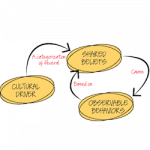The Stepford Wives is a movie (it’s been made twice, actually) based on a book by Ira Levin wherein all the women of Stepford, Connecticut are practically identical. They dress the same way, talk the same way about the same things, and behave towards their husbands in the same manner. It turns out that they are all animatronic robots. (Sorry if this spoils the movie for you.)
Some organizations, particularly successful and popular ones, turn themselves into Stepford by hiring only those people who walk and talk just like the people already in the organization.
Sometimes, and this is a bit more insidious; HR people only hire people who look like themselves. Again, the organization begins to become Stepford.
Naturally enough, if there is no beneficial disruption, no influx of fresh faces and fresh thinking, the organization becomes predictable and eventually moribund.
A Stepford organization has this unspoken rule:



 A culture killer is what ruins workplace culture in spite of your every effort. When we were researching our new book,
A culture killer is what ruins workplace culture in spite of your every effort. When we were researching our new book, 

 Tom DeMarco’s speculative novel,
Tom DeMarco’s speculative novel,  How workplace culture affects workplace performance: We know they’re linked, but now we know a bit more about how and why:
How workplace culture affects workplace performance: We know they’re linked, but now we know a bit more about how and why: 

 Two coauthors reflect on some of the unexpected implications that a reader may detect in what they’ve written.
Two coauthors reflect on some of the unexpected implications that a reader may detect in what they’ve written. 






